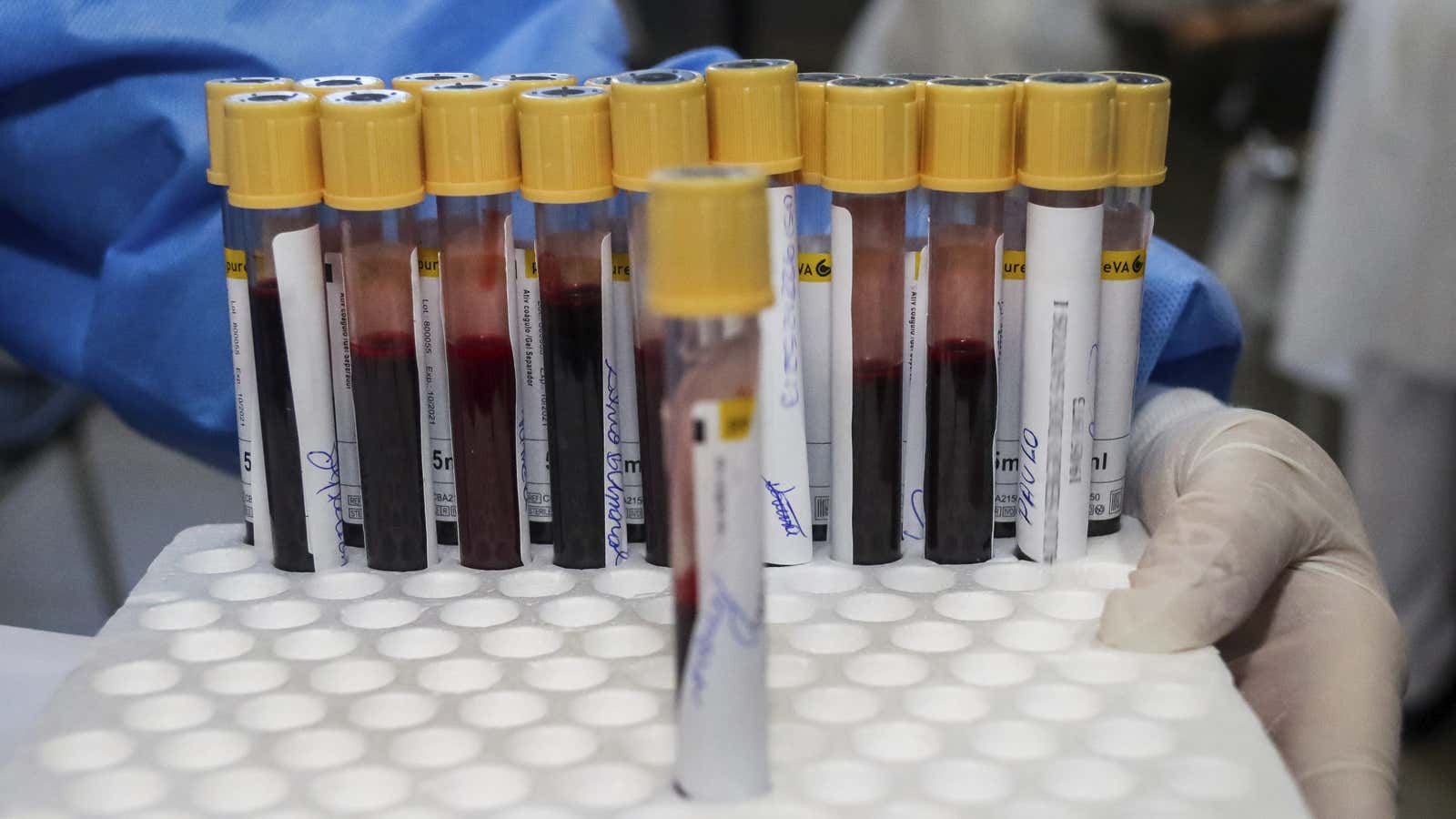A blood test that can detect pre-symptomatic Alzheimer’s could be approved in just a few short years.
At this years’ virtual Alzheimer’s Association International Conference (AAIC), researchers from institutions across the US and Switzerland reported that a particular blood-borne protein could indicate Alzheimer’s pathology in the brain. And another study suggested that protein could even be used to predict who would become sick—long before they start experiencing confusion and memory loss.
Pharma giant Eli Lilly is involved in some of these studies, suggesting that the company could one day produce diagnostic tests for the most common form of dementia.
Realistically, though, a blood test for Alzheimer’s probably wouldn’t be used by the general public—at least not right away.
Before using a blood test to screen potential patients, doctors need to be sure that an early diagnosis would actually improve their health. But there hasn’t been a new drug approved to treat Alzheimer’s in nearly two decades; even if doctors could find Alzheimer’s patients sooner, there isn’t much they could do to slow the disease’s progression.
That means until a treatment or more evidence of other positive interventions emerges, a blood test would be unlikely to be used for general screening.
It’s the same reason why the US Preventive Services Task Force (USPSTF), an independent group funded by the US government to provide guidelines for health care providers, doesn’t recommend cognitive screening for older adults. While these written and verbal tests can indicate the presence of mild cognitive impairment, the precursor for Alzheimer’s and other dementias, the group hasn’t found clear evidence that discovering that impairment early actually helps patients.
The USPSTF’s opinion is important, because it informs whether insurance companies will cover a test—another crucial gate for public access.
Currently, people experiencing symptoms of Alzheimer’s can undergo two tests to try to confirm a diagnosis. The first is a PET scan, whose average $5,500 price tag isn’t covered by private insurance or Medicare. The second is a spinal tap, which is cheaper—to the tune of hundreds of dollars—and is covered by insurance. But it involves sticking a needle into the spine to extract some of the fluid that surrounds the brain.
A blood test would probably be on par with a spinal tap in terms of price, but it’d be dramatically less invasive, which could help persuade insurance companies to cover it. But with no approved treatments for Alzheimer’s disease, a blood test “may not lower overall healthcare costs,” says Suzanne Schindler, a neurologist at Washington University at St. Louis who presented some of the work at AAIC.
Patients and their families can get some comfort from having a definitive diagnosis, and it could help them plan ahead for the care they’ll need. But without a treatment, it’s likely they’d have to pay for a blood test out of pocket, making that kind of planning a luxury for the privileged.
That’s not to say a blood test isn’t a critical tool in the fight against Alzheimer’s: Most immediately, an approved test would support clinical trials for Alzheimer’s treatments.
The closest therapy on the horizon is aducanumab, which US-based Biogen submitted to the US Food and Drug Administration for approval earlier this month. Experts are more excited about this drug’s prospects than decades of flubs: Unlike the drugs that were previously approved to treat mild cognitive impairment, aducanumab is the first to actually test for the presence of Alzheimer’s-related brain proteins like amyloid, with PET scans and spinal taps. Results showed that, sure enough, the drug reduced the presence of amyloid, and it improved some cognitive symptoms.
Other therapies simply looked at improvements in cognition over time, but technically, weren’t looking for the disease’s chaotic signature in the brain. It’s possible that some of the many failed Alzheimer’s drugs weren’t even tested on people who had the disease. An easy blood test could increase the reliability of these trials by screening participants to make sure they’re a good match.
A blood test for Alzheimer’s would still be a major breakthrough in the field—but for the benefits to reach the general public, it’ll take a few more developments.
